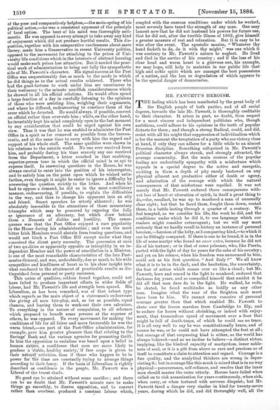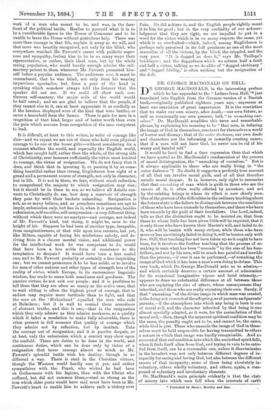MR. FAWCETT'S HEROISM.
THE feeling which has been manifested by the great body of the English people of both parties, and of all social degrees, towards the late Mr. Fawcett, is thoroughly creditable to their character. It arises in part, no doubt, from respect for a most sincere and independent politician who, though ambitions, could adhere to his opinions in the teeth of popular distaste for them ; and though a strong Radical, could, and did, resist with all his might that suppression of individualism which is for the moment the temptation of a party who see victory close at hand, if only they can adhere for a little while to an almost Prussian discipline. Something self-poised in Mr. Fawcett's political character always struck, and strongly attracted, the average community. But the main sources of the popular feeling are undoubtedly sympathy with a misfortune which appeals in a special degree to the active and energetic, exciting in them a depth of pity rarely bestowed on any physical ailment not productive either of death or agony, and admiration of the courage with which the natural consequences of that misfortune were repelled. It was not merely that Mr. Fawcett endured those consequences with- out loss of heart or ulceration of spirit, in itself a great thing to do,—for, recollect, he was up to manhood a man of unusually clear sight; but that he faced them, fought them down, routed them, in a battle lasting through a quarter of a century. We feel tempted, as we consider his life, the work he did, and the conditions under which he did it, to use language which our readers might consider extravagant ; but we will say most seriously that we hardly recall in history an instance of personal heroism,—heroism of the lofty, self-conquering kind,—to which it can be fittingly compared. If there is one to be found, it is in the life of some martyr who found no nicer vales, because he did not die of his torture ; or in that of some prisoner, who, like Poerio, parted with the light of day for years for the sake of his country; and yet on his release, when his freedom was announced to him, could ask as his first question, "And Italy P" We all know what it is to be in the dark, and the hesitation, the uncertainty, the fear of action which comes over us like a cloud ; but Mr. Fawcett, born and reared in the light to manhood, endured that darkness foe. years, and so compelled himself that amidst it he did all that men dare do in the light. He walked, he rode, he skated, he faced multitudes as boldly as any other man. Imagine what the roar of the Brighton mob must have been to him. We cannot even conceive of personal courage greater than that which enabled Mr. Fawcett to skate over the frozen marshes from Cambridge to Ely, and to endure for hours without shrinking, or indeed with enjoy- ment, that tremendous speed of movement over a floor that might be full of death-traps, of which he could see no trace. It is all very well to say he was constitutionally brave, and of course he was, or he could not have attempted the feat at all ; bat courage of that surpassing kind is either, as the world has always believed—and as we incline to believe—a distinct virtue, implying, like the kindred capacity of martyrdom, inner noble- ness of soul, or it is a gift from above so rare and precious as of itself to constitute a claim to attention and regard. Courage is a fine quality, and the analytical thinkers are wrong in depre- ciating it; but in courage like this much is mixed that is in no way physical—perseverance, self-reliance, and resolve that the inner man should master the outer utterly. Heroes have failed when called on to risk assassination for years continuously, when sick, when sorry, or when tortured with nervous disquiet; but Mr. Fawcett faced a danger very similar in kind for twenty-seven years, during which he did, and did thoroughly well, all the work of a man who meant to be, and was, in the fore- front of the political battle. Realise to yourself what it is to be a considerable figure in the House of Commons and to be unable to leave the House without gratuitous help. There was more than courage in that life, explain it away as we will, and that mare was heartily recognised, not only by the blind, who everywhere watched Mr. Fawcett's career with pathetic eager- ness and sympathy, feeling him to be in so many ways their representative, or rather, their ideal man, but by the whole seeing population, who could hardly enough admire the self- mastery patent to them whenever Mr. Fawcett presented him- self 'before a popular audience. The audiences saw, it must be remembered, that he was blind, not only from his wearing impervious spectacles, but from a pose of the head in speaking which somehow always told the listener that the speaker did not see. If we could all show such con- tinuous self-mastery, the major evils of the world would be half cured ; and we are glad to believe that the people, if they cannot rise to it, can at least appreciate it as cordially as if the heroism displayed were of the kind that wins battles, or saves a household from the flames. There is gain for men in a reognition of that kind, larger and of better worth than even the gain which accrues from recognition of the man competent to lead.
It is difficult, at least to this writer, to write of courage like this—and we repeat we are not of those who hold even physical courage to be one of the lesser gifts—without considering for a moment whether the world, and especially the English world, which has caught half, rather than the whole, of the strong side of Christianity, ever honours sufficiently the virtue most kindred to courage, the Virtue of resignation. We do not fancy that it does, and think that in ignoring it, or passing it by as some- thing beautiful rather than strong, Englishmen lose sight of a grand and a permanent source of strength, not only in character, but in life. It is not in them, we fear, without much reflection, to comprehend the majesty to which resignation may rise; but it should be in them to see, as we believe all Asiatic con- verts to Christianity do see, how deep a reservoir of strength they pass by with their buckets unheeding. Resignation is not, as so many believe, and as preachers sometimes are apt to imply, submission only, but has in it, when it is genuine, besides submission, self-sacrifice, self-compression—a very different thing, without which there were no martyrs—and courage, not indeed of Mr. Fawcett's kind, but rising, it might be, even to the height of his. Suppose he had been of another type, incapable, from imaginativeness, of that ride upon iron runners, but yet, like Milton, capable of facing his misfortune calmly, and de- riving from it a clearer mental vision, and additional power for the intellectual work he was competent to do, would that have been a less noble form of resistance to the temptation to despair? It would have been a less useful one, and to Mr. Fawcett probably or certainly a less inspiriting one ; but we cannot pronounce it to be less noble, or to involve for men of other natures and other types of strength less of the reality of virtue, which Europe, in its unconscious linguistic wisdom, has made to mean both manliness and goodness. The passive virtues do not suit our people; and it is profitless to tell them that they are often as manly as the active ones, that to wait sitting is often the highest proof of courage, that to endure may require more fortitude than to fight, and that the men on the 'Birkenhead' equalled the men who rode at Balaclava ; but it is well to remind them sometimes of abstract truths, and this is one,—that in the resignation which they only admire as they admire meekness, as a quality which it takes a revelation to make fully admirable, there is often present in fall measure that quality of courage which they admire not by reflection, but by instinct. Take the courage out of resignation, and it is passive despair, or at best, only the submission which a convict may show upon the scaffold. There are duties to be done in the world, and continuous duties, which can be done only by virtue of a resignation that taxes courage almost as much as Mr. Fawcett's splendid battle with his destiny, though in so different a way. There is steel in the Christian virtues, though the Western world hardly sees it yet, and rather sympathises with the Frank, who wished he had been on Gethsemane with his legions, than with the Christ who suffered, but did not summon them,—steel as strong as the iron which older poets would have said must have been in Mr. Fawcett's heart to enable him to achieve such a victory over Fate. He did achieve it, and the English people rightly count it to him for good ; but in the very cordiality of our acknow- ledgment that they are right, we are impelled to put in a word for the virtue which is in so many respects the same, yet which is so overlooked—which, indeed, among Englishmen is perhaps only perceived in its full greatness as one of the most masculine of all the virtues, by the blind, the crippled, and the very poor. "It is dogged as does it," says Mr. Trollope's bricklayer ; and the doggedness which we esteem half a fault and half a virtue, talking as we do alike of "dogged obstinacy" and "dogged fidelity," is often nothing but the resignation of the dull.



































 Previous page
Previous page